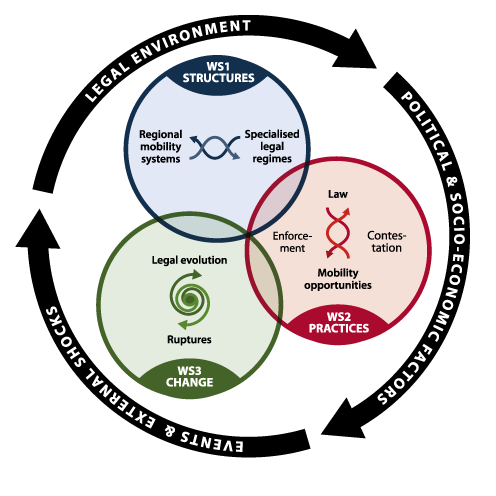Research
Human mobility has always been a precondition for development, cultural exchange and, ultimately, survival. Yet, today few other issues remain subject to such detailed and elaborate regulation. From immigration rules to visa and aviation standards, laws govern not only who has access to mobility, but also how easy and along which routes people move.
Laws related to mobility define individual livelihood opportunities, social structures, and the economic development of countries. Yet, the legal regulation of human mobility has never been systematically studied. Consequently, we know little about how different laws interact and shape mobility across geographies, social divides, and time. Addressing this gap, MOBILE aims to provide the first comprehensive study of global mobility law covering different regions in both the Global North and South.

During the initial six-year period of the Center’s research programme, MOBILE will study three interconnected dimensions of mobility law:
Work stream 1: Structures
We examine the composition and interconnectedness of legal infrastructures within four key regional systems of mobility law, and their relationship to specialized legal regimes.
Key research questions
- Which types of regime entanglement characterise regional mobility systems?
- How connected are regional legal infrastructures, internally and externally?
Work stream 2: Practices
We undertake three thematic case studies to analyze the legal and political processes through which legal infrastructures are enforced and contested; and how such practices directly and indirectly structure mobility opportunities.
Key research questions
- How do enforcement and contestation practices shape mobility opportunities?
- Under what circumstances do authorities choose to selectively apply, ignore, or challenge mobility laws?
Work stream 3: Change
Combining the above, we investigate how ongoing practices prompt normative change in legal infrastructures, and the conditions under which socio-natural and political events (e.g., terrorism, disasters, and COVID-19) reconfigure legal entanglements.
Key research questions
- Which endogenous and extraneous factors drive evolution and ruptures in global mobility law?
- How does global mobility law respond to shifting political and socio-economic environments?
Additional research projects hosted by MOBILE
In addition to its core grant from the Danish National Research Foundation, MOBILE is host to a number of other externally funded research projects addressing different aspects of mobility law, supported by e.g. the Nordic Research Council, the Independent Research Fund Denmark, the Villum Foundation, the Volkswagen Foundation, and the European Commission. A number of these projects involve external partners and are organised in the Center’s interdisciplinary methods hub.

